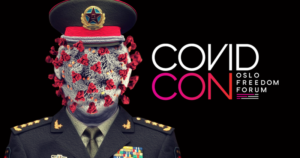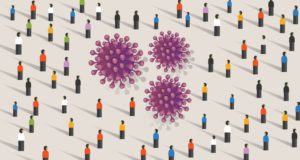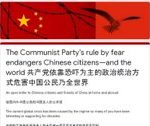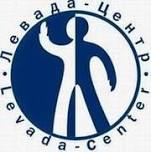 Authoritarian-minded leaders around the world have used the coronavirus emergency to consolidate power. In Europe, the governments of Poland and Hungary have done that and more. They have managed to turn the crisis into a windfall and punish their political opponents, too, the New York Times’ reports:
Authoritarian-minded leaders around the world have used the coronavirus emergency to consolidate power. In Europe, the governments of Poland and Hungary have done that and more. They have managed to turn the crisis into a windfall and punish their political opponents, too, the New York Times’ reports:
Hungary’s Viktor Orban is finding ways to punish the opposition,” said R. Daniel Kelemen, a professor of political science and law at Rutgers University. The European Commission has done nothing meaningful to “stand up to Orban but has helped him,” Mr. Kelemen said, while the council of heads of state and government has not wanted to confront one of its own. “The E.U. provides money without accountability,” he said….. Kelemen notes that Hungary is no longer characterized as a full democracy by groups like Freedom House, while Mr. Orban creates what he calls an “illiberal’’ state.

National Endowment for Democracy
So far the government has been careful not do anything under the emergency decree that it could not have done otherwise, said Peter Kreko, director of Political Capital, a Budapest research institution. “But what has been done so far has been pretty horrible,” he said.
The impact of the coronavirus in the Middle East has led to shifts in the nature of authoritarianism, according to Carnegie analysts Nathan J. Brown, Intissar Fakir and Yasmine Farouk.
The coronavirus may be deepening dictatorship in some parts of the region, but there are subtle shifts at work as well—not in the degree of authoritarianism but in its nature, they suggest:
- One such shift is a rise in the appeal of technical expertise. In many countries new actors within the state apparatus seem to be playing a larger role in implementing and even driving policy. Religious establishments, medical syndicates, and local governments seem to be taking initiative on their own in some countries, but not all, rather than reacting to higher-level direction..
- A second shift has occurred with respect to those who appear publicly in charge. More generally, whatever is happening behind the scenes, autocratic rulers are often stepping back and allowing technical experts and formerly faceless officials to take the lead in explaining policies and providing information. …
- A third shift is the diminution of fragmentation, scapegoating, and conspiracy theories. ….An organic collective agreement may actually be rising in some places to focus on immediate and aggressive measures rather than indulge in conspiracy theories and use these to further divide populations. …
- A fourth shift pertains to enhanced policing of information. Because of the coronavirus, the centrality of states in gathering and providing information is even more remarkable than usual. Technology may facilitate daily lives under lockdown, but it also aids in the official control of information….
- A fifth shift is that the coronavirus has activated new local and civil society participants. In some countries, the crisis has created openings for disempowered or overlooked actors—municipalities, provincial councils, grassroots organizations, private voluntary bodies—to step into the breach, providing services and disseminating supplies, supplying information, and translating general national guidance into specific local measures….
- A sixth shift is that while most states are addressing the impact of the coronavirus independently of each other at the diplomatic level, the nature of the crisis has led states to mimic each others’ actions or present themselves as avoiding their mistakes. …RTWT
 On the theory of never letting a good crisis go to waste, the world’s strongman leaders can be expected to exploit the COVID-19 pandemic to achieve an even tighter grip on the media, note Arch Puddington, a Senior Scholar at Freedom House, and David J. Kramer, a Senior Fellow at Florida International University’s Steven J. Green School of International and Public Affairs. Here are several possible developments to watch for, they write for The American Interest:
On the theory of never letting a good crisis go to waste, the world’s strongman leaders can be expected to exploit the COVID-19 pandemic to achieve an even tighter grip on the media, note Arch Puddington, a Senior Scholar at Freedom House, and David J. Kramer, a Senior Fellow at Florida International University’s Steven J. Green School of International and Public Affairs. Here are several possible developments to watch for, they write for The American Interest:
 First, we can expect China to accentuate a trend towards the extension of its global propaganda and social media disinformation. This could serve multiple purposes, most notably the promotion of Beijing’s explanation of the virus’s origins. In the past, the objective has been to convince foreign countries to refrain from publicly criticizing Beijing’s domestic repression and aggressive foreign policy, including bullying of Hong Kong, interference in Taiwan, or claims to sovereignty in the South China Sea.
First, we can expect China to accentuate a trend towards the extension of its global propaganda and social media disinformation. This could serve multiple purposes, most notably the promotion of Beijing’s explanation of the virus’s origins. In the past, the objective has been to convince foreign countries to refrain from publicly criticizing Beijing’s domestic repression and aggressive foreign policy, including bullying of Hong Kong, interference in Taiwan, or claims to sovereignty in the South China Sea.- Second, America and other democracies should pay special attention to developments in countries like India, Hungary, Poland, the Philippines, and Brazil, where democratic norms are currently under assault by strongmen. In these countries, the ruling parties still confront an active opposition at the polls, a press that has not yet been completely extinguished, protests (albeit not under current virus constraints) and competition, sometimes vigorous, at the local level. …..
 Third, we should expect an assertive campaign from autocrats to persuade their populations—and the world—that censorship is a prudent step not only while the pandemic rages but even after the disease is conquered. Until recently, autocrats were content to argue that restrictions on freedom were in keeping with the preferences of domestic constituencies and in line with local cultures. ….. And yet in Russia, a recent poll by the Levada Center found that 24 percent of Russians completely distrust the official information about the coronavirus situation that is disseminated in the state media, and 35 percent only partially trust it. The mounting toll in Russia, despite Putin’s efforts to control the narrative, may well accelerate growing distrust in the regime. RTWT
Third, we should expect an assertive campaign from autocrats to persuade their populations—and the world—that censorship is a prudent step not only while the pandemic rages but even after the disease is conquered. Until recently, autocrats were content to argue that restrictions on freedom were in keeping with the preferences of domestic constituencies and in line with local cultures. ….. And yet in Russia, a recent poll by the Levada Center found that 24 percent of Russians completely distrust the official information about the coronavirus situation that is disseminated in the state media, and 35 percent only partially trust it. The mounting toll in Russia, despite Putin’s efforts to control the narrative, may well accelerate growing distrust in the regime. RTWT
In a recent succinct and powerful analysis, Douglas Rutzen and Nikhil Dutta of the International Center for Not-for-Profit Law (ICNL) review state action to automate social control in China and to curb protests in Iraq and Kyrgyzstan – all justified by the response to COVID-19, adds David Patterson at the Groningen Research Centre.







